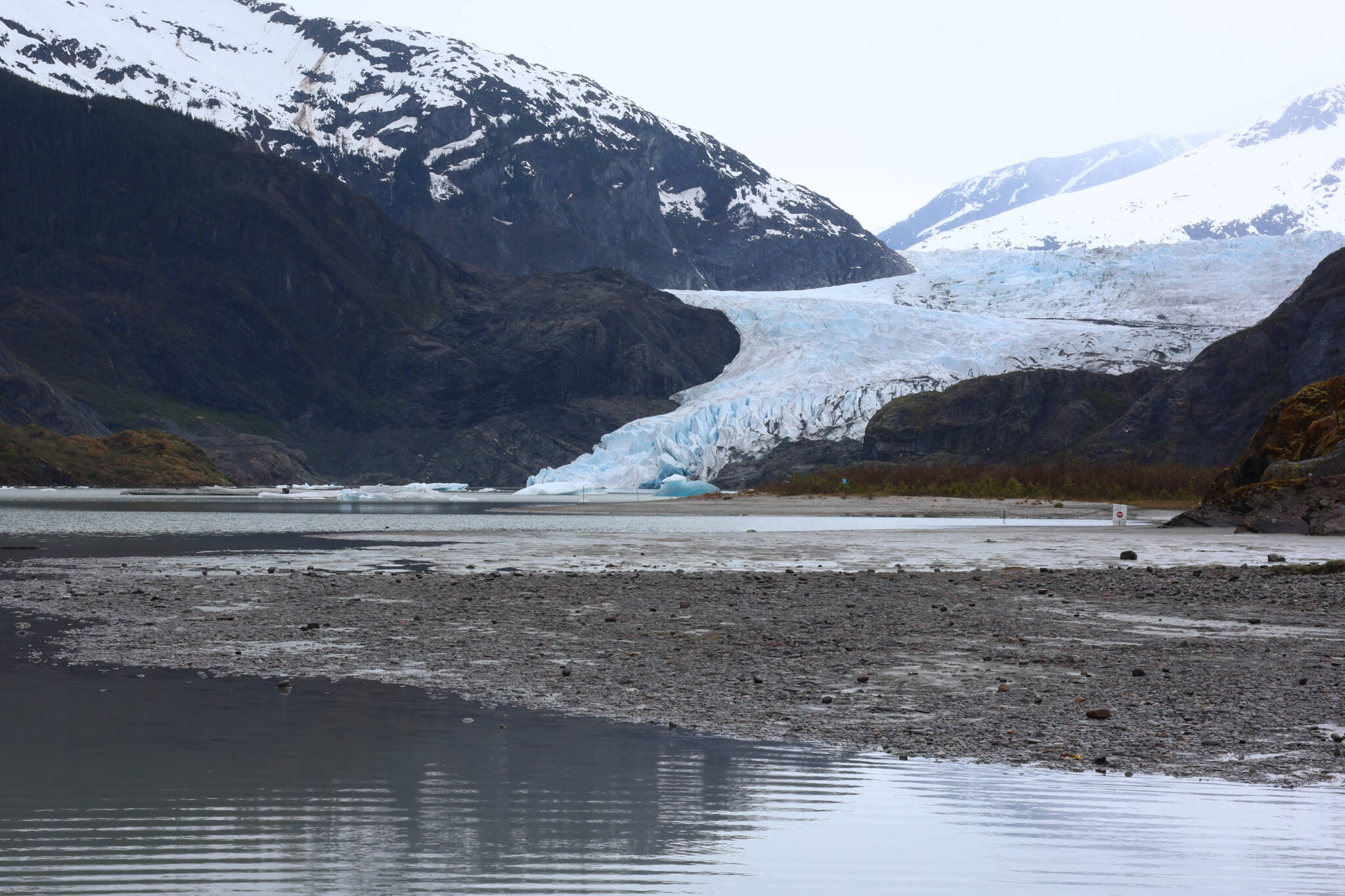A ban on mining and oil drilling on lands around the receding Mendenhall Glacier was announced Friday by the Bureau of Land Management and has nearly unanimous support from people and organizations submitting public comments.
But the Alaska Department of Natural Resources (DNR) is questioning both the impact of the restrictions and the federal government’s jurisdiction, citing a lawsuit by the state claiming it owns the submerged lands in the area.
A Public Land Order for about 4,560 acres of National Forest System lands surrounding the glacier means the area is off-limits to mineral extraction activities. The order may have little practical impact since there does not appear to be significant industry interest in mining or oil exploration in one of Alaska’s biggest natural tourist sites, with about 700,000 people currently visiting annually.
There is already an existing ban on areas of land previously covered by the Mendenhall Glacier, which has been receding since the end of the last mini-ice age in the 1700s, according to BLM. The new order expands the ban area as Alaska’s glaciers are now among the fastest-retreating on the planet.
“The new withdrawal establishes protection for areas becoming accessible as the glacier recedes,” a BLM press release announcing the order stated. “The glacier’s retreat is also opening new ecosystems in the area, making salmon, bears and other wildlife more prevalent. The glacier’s retreat makes it necessary to withdraw newly exposed lands to preserve these unique habitats, natural resources and setting.”
The order also overlaps federal plans to overhaul the Mendenhall Glacier Recreation Area, including a variety of new visitor facilities, expanding trails and implementing policies such as a continuing ban on motorized tour boats. Limited public comments on that plan are being accepted until the end of this month in reaction to a draft decision declaring a preferred alternative published last month.
An announcement last October about the proposed ban on resource extraction ban near the glacier received 28 online public comments. Among individual responses, all but one expressed strong support for the ban.
”It is my belief that the protection of the land exposed by the diminishing glacier is more valuable and beneficial to the environment and the surround community in the long term than any immediate commercial gain found from digging below its surface might garner,” wrote Desiree Downey, a state research analyst in Juneau.
The exception among the individual responses was Jason Cameron, a health and safety training supervisor for Coeur Mining, who submitted his comment without affiliating himself with the company.
“I believe it would be in our community’s best interest for this land to be available for exploration and potential mining,” he wrote. “Mining has come a long way and can be done in an environmentally safe manner. For example, Kensington’s permits say their discharge water is cleaner than the drinking water standard. The two mines that are located near Juneau are the biggest employers in Southeast Alaska. Mining is a great career opportunity for young men and women in our state. I really only see this as a positive for our community.”
Among organizational representatives expressing support for the ban was Richard Chalyee Éesh Peterson, president of the Central Council of Tlingit and Haida Indian Tribes of Alaska.
“Tlingit & Haida greatly appreciates your analysis to create ‘reasonably foreseeable scenarios’ to illustrate how mineral exploration can significantly impact the recreational and scenic integrity of the MGRA,” he wrote. “Tlingit & Haida acknowledges that the Secretary of the Interior does not have the authority to make this a permanent withdrawal, but we would welcome and encourage an Act of Congress to consider this withdrawal’s permanency to protect this area for the generations to come.”
The most adamant and specific objections to provisions of the ban came from the state DNR.
The first objection asserted “the U.S. Forest Service is circumventing the intent of the Alaska National Interest Lands Conservation Act,” which requires Congressional approval for making 5,000 or more acres of land off-limits to mineral resource activity. The DNR statement argued both the existing and new sections of off-limits land surrounding the glacier should be considered as one parcel.
“If applied widely, this policy would allow incremental public land orders to gradually withdraw land adjacent to pre-1980 withdrawal boundaries so long as each stayed under 5,000 acres, thereby circumventing the intent of ANILCA,” the statement by DNR asserted.
The state’s lawsuit claiming it owns the submerged lands in the area — essentially meaning Mendenhall Lake and Mendenhall River — should also be reflected in the area DNR is allowed to place off-limits, according to the DNR statement.
“Within the 20-year scope of the proposed withdrawal, potential exists for glacial retreat to expose portions of Mendenhall Lake that would be considered navigable and state owned,” the DNR statement noted, “All maps and descriptions should identify state-owned lands and waters, including all of Mendenhall Lake as it changes over time.”
• Contact reporter Mark Sabbatini at mark.sabbatini@juneauempire.com or (907) 957-2306.

